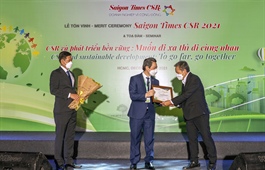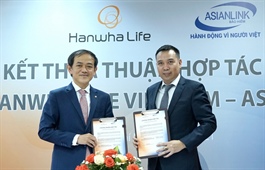South Korean banks add to prospects in Vietnam
South Korean banks add to prospects in Vietnam
Vietnam is well-positioned to become an alluring investment constituent in Southeast Asia, particularly for South Korean financial holdings.
Handico Finance JSC (HAFIC), a consumer finance subsidiary of Investment and Hanoi Housing Development Corporation, is presently the focus of several domestic and international organisations.
An expert from MB Securities Company (MBS) revealed to VIR that Vietnamese bank TPBank, Japan’s AFS Financial Services of AEON Group, and South Korea’s KB Kookmin Card are showing appetite in acquiring HAFIC, despite its inactivity under special supervision of the State Bank of Vietnam since 2015.
In March, JB Financial Holdings from South Korea was reportedly interested in purchasing HAFIC in a bid to expand its presence in Vietnam after acquiring a securities company in Hanoi.
Hyundai Card, the credit card company of South Korean automaker Hyundai Motor, in March failed to purchase 50 per cent of FCCOM, the consumer finance arm of MBS, in a $42 million deal.
South Korean companies, however, have still invested in numerous prominent finance-related corporations across Vietnam. With a comprehensive and favourable legal corridor, the market is now witnessing a significant shift towards South Korean players looking to tie the knot with Vietnamese financial companies.
Last week, National Assembly Chairman Vuong Dinh Hue expressed his appreciation for the cooperation and strategic shareholder ties between KEB Hana Bank, a subsidiary of Hana Financial Group, and the state-owned lender BIDV in the past two years during his visit to South Korea. BIDV has produced significant improvements in business performance and corporate governance following international standards because of the aforesaid collaboration.
Based on the favourable outcomes of the two banks’ previous collaboration, Hue urged that KEB Hana Bank continues to offer advanced management expertise, innovative business strategies based on technology, and encourage South Korean partners to further enhance their investment activities across Vietnam.
Hana Financial Group’s chairman Jung-tai Kim appreciated Hue’s actions in accompanying and paying close attention to assisting enterprises in overcoming problems.
Kim stated, “We have successfully executed our commercial goals in Vietnam during the last two years. We intend to participate in BIDV’s capital growth strategy and pledge to continue expanding collaboration to assist BIDV in developing effectively.”
The NA chairman also encouraged South Korean financial behemoths to ramp up their presence in Vietnam with diversified financial offerings.
The forthcoming adaptation of a new legal framework for Vietnam’s stock market, particularly the non-voting depository receipt in the amended Law on Securities, could be impetus for South Korean financiers in Vietnam, Hue highlighted.
“Vietnam welcomes the involvement of credit institutions with financial capacity and expertise to improve the efficiency of the credit institutions’ system,” he explained.
Regarding the upcoming opening of a Korean Development Bank (KDB) branch in Hanoi, Vietnamese Deputy Prime Minister Le Minh Khai said that this is in line with the MoU signed by the two countries’ deputy prime ministers two years ago.
“Thus, KDB should speed up the process and open a Hanoi branch as soon as possible,” the deputy PM shared with chairman and CEO of KDB, Lee Dong-Gull.
KDB is a wholly-owned policy development bank in South Korea, with the mission of assisting in the execution of government programmes and offering complete corporate banking services. It offers financial assistance to several South Korean firms in Vietnam and collaborates with the Ministry of Finance to design a development strategy for the Vietnam Development Bank.
KDB, according to its announcement, will assist South Korean and Vietnamese enterprises in the infrastructure sector when it opens an office in Vietnam.
Several other South Korean financial groups remain keen on expanding their footprint in Vietnam since the country is projected to play a crucial role in the global supply chain. Shinhan Bank and Woori Bank are among nine foreign-owned banks in Vietnam whose activities remain robust thanks to strong South Korean inflows.
During the Vietnamese NA chairman visit last week, some South Korean financial groups also announced that they would participate in various fields, such as mobile money and digital banking, and expect Vietnam to soon lift the foreign ownership ratio.
























